By Tom Jarvis
In July of this year, the New Hampshire Bar Association turns 150. In observance of our sesquicentennial celebration, and with respect to our rich history as an association, we thought it would be fun to catch up with some past bar presidents to see what they have been doing since they were in office and to ask them how much the bar has changed in that time. However, as bar presidencies last only a year, there are a lot of past bar presidents, and featuring them all would cause this article to take up all 40 pages of the issue. To narrow it down, I decided to talk with the four oldest living past presidents and the first female president.
Patti Blanchette

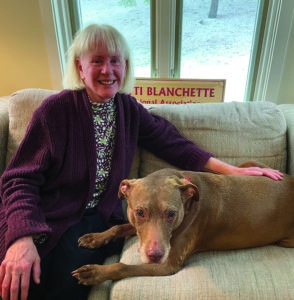
In 1992, Patti Blanchette became the first female bar president in New Hampshire. She was also the first Franklin Pierce Law Center graduate to become bar president, and at the time, one of only eight women bar presidents in the country. After graduating from college in 1974, Blanchette was elected to the legislature to represent her hometown of Newmarket and continued doing so for 14 years. In 1980, she received her law degree from Franklin Pierce Law Center and began working parttime for Boynton, Waldron, Doleac, Woodman, and Scott so she could continue serving in the legislature. “At that time, it was fashionable to have A woman lawyer. Not two, not five – just one,” Blanchette says. “It was hard because you’d apply for a place, and they would be like, ‘well, we already have our woman lawyer.’” However, once she became bar president, that dynamic began to shift. “There was no overt discrimination or anti-female sentiment,” Blanchette says. “It was just who was in the room. Somebody opened the door for me and let me in the room, and I wanted to keep that door open.”
After her term was over, she continued working at Boynton Waldron until 2000, when she became a solo practitioner. She moved her practice to her home right before the pandemic and now operates out of her house with her faithful paralegal, Hershey the dog.
Blanchette says the bar has become more diverse since her presidency, not only in terms of ethnicity but in terms of the law schools that people went to.
“And you look around the room now and see many more women. A lot more women have become president and have been appointed to the bench,” Blanchette says. “When I started out, I can remember going to the courthouse and people saying, ‘are you waiting for your lawyer?’ That doesn’t happen anymore to my knowledge. The committees are also broader. Paul McEachern was the first bar president that wanted to broaden the leadership of the bar.”
When asked if she has any advice for lawyers considering a term in bar governance, Blanchette says to get involved and look for an entryway. “Let someone know you’re interested in a committee,” Blanchette says. “Go to the annual meeting, too. You’ll get CLE credits, and you’ll meet other attorneys that could provide an entry for you. You can make a difference on the board of governors. You can speak up, and people will listen, and decisions get made.”
Jack Middleton
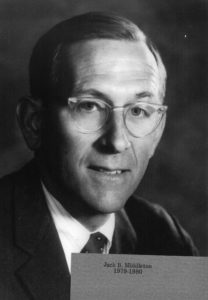
 At 93 years old, Jack Middleton is the oldest living past president. After graduating from Boston University School of Law in 1956, he started at McLane, Graf, and Raulerson, which would eventually become McLane Middleton. While working at McLane, he was appointed as a part-time municipal judge in 1962 and then became Special Justice of Merrimack District Court in 1971. In 1979, he became bar president.
At 93 years old, Jack Middleton is the oldest living past president. After graduating from Boston University School of Law in 1956, he started at McLane, Graf, and Raulerson, which would eventually become McLane Middleton. While working at McLane, he was appointed as a part-time municipal judge in 1962 and then became Special Justice of Merrimack District Court in 1971. In 1979, he became bar president.
“It got me more interested in bar activities,” Middleton says of his presidency. “And as a result, I went on to be active for a number of years in the ABA and the National Conference of Bar Presidents.”
Since his term as bar president, Middleton helped form the IOLTA program in 1982 and continued as a part-time judge until 1986. From 1999 to 2002, he served as the Secretary of the American Bar Association. He was also a two-time chair of the New Hampshire Bar Foundation.
Throughout his entire career, even as a part-time judge, he stayed with McLane, where he remains to this day. He often jokes with people that he has one of the shortest biographies ever.
He also graciously participated in the NHBA sending a lawyer back to law school for a day this past year (see the article in the December 2022 issue).
“The bar has grown enormously since I was bar president,” Middleton says. “When they opened the floodgates to admission on motion, we got a lot more members. One of the results of that is a first-class CLE program that we didn’t have when I was president. We also have publications like the Bar News, that are much better today than they were.”
Middleton strongly encourages other lawyers to get involved in bar governance if they can.
“It’s a lot easier to accomplish things – whether it be trials, contracts, or whatever – if you know the lawyer on the other side,” Middleton says. “I also encourage people to get out there and get involved in the other bar activities when possible and get to know the other people practicing law in the state.”
Jonathan Ross

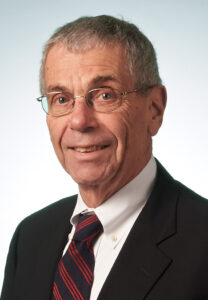 Jonathan Ross graduated from Georgetown University Law School in 1967 and then spent a year getting his LLM at Harvard Law School. He then moved to NH in 1968 and joined the firm of Wiggin and Nourie. In 1985, he began his term as bar president.
Jonathan Ross graduated from Georgetown University Law School in 1967 and then spent a year getting his LLM at Harvard Law School. He then moved to NH in 1968 and joined the firm of Wiggin and Nourie. In 1985, he began his term as bar president.
As president, he – along with thenMassachusetts bar president Michael Greco and then-Texas bar president Bill Whitehurst – developed Bar Leaders for the Preservation of Legal Services for the Poor, a commitment of bar leaders across the country to preserve the Legal Services Corporation (LSC) and save federal funding for indigent legal services.
“We set out on a mission to get every state bar and every large metropolitan bar to join us in pushing Congress to adequately fund the LSC,” Ross says. “Ultimately, we got all the states and metropolitan bars to join us and funding for legal services has been the number one legislative priority for the ABA for years now. Whitehurst, Greco, and I appeared in Congress and testified, and we would go to LSC board meetings to testify and challenge some of the things they were doing. We were reasonably successful, but the fight continues, and it’s not a race for the short-winded.”
After his term as bar president, Ross continued working at Wiggin and Nourie until they closed in 2012. He then joined Primmer, Piper, Eggleston, and Cramer, where he still practices. He has also continued to be active in governance and committees, including 20 years representing NH at the New England Bar Association and eight years (three of which he was chair) on the ABA’s Standing Committee on Legal Aid and Indigent Defendants.
When asked what changes he has seen in the NH Bar since his presidency, Ross says it has grown quite a bit.
“Part of the fallout of that is that there are fewer lawyers who know each other, which tends to diminish the civility and cooperativeness that was part of this bar association when I joined,” Ross says. “That’s not to say it’s gone, it’s just harder. And, as a consequence of the growth, there are a lot more lawyers who have practiced on their own without mentoring and without the kind of examples that I grew up with as a lawyer in this bar.”
Ross believes that getting involved in bar governance is rewarding and part of a lawyer’s professional obligation.
“[Lawyers] should get involved because it’s their profession,” Ross says. “What we do and how we appear to the public and how we give back to the community that gives us a lot of power and the opportunity to make a reasonable living is part of our professional obligation.”
Hon. Richard Galway
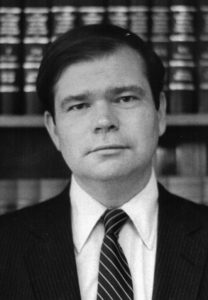
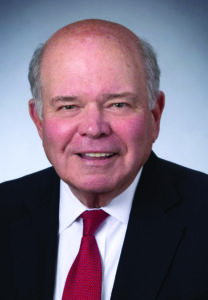 In 1970, when he graduated from Boston University Law School, Richard Galway joined the firm of Devine Millimet. He became bar president in 1982 and remembers having to travel from bar association to bar association to make sure attorneys paid a $25 assessment fee to the New Hampshire Supreme Court.
In 1970, when he graduated from Boston University Law School, Richard Galway joined the firm of Devine Millimet. He became bar president in 1982 and remembers having to travel from bar association to bar association to make sure attorneys paid a $25 assessment fee to the New Hampshire Supreme Court.
“There was a case that was a real estate scam issue and for some reason or another it ended up at the New Hampshire Supreme Court,” Galway says. “Chief Justice John King ordered an additional assessment of $25 per lawyer. It was my job to go to each bar association to inform them of the reason for the assessment and make sure they paid it.”
Galway says one of the biggest changes in the NH Bar since he was president is the number of NHBA staff.
“When I was president, we had only a staff of two at the NHBA, an executive director and a part-time staff assistant,” Galway says. “The lawyers did a lot of the administrative stuff, and there wasn’t much CLE – it wasn’t like what we have now – it was mostly privatized. Most of the services the NHBA offers now weren’t available, either. It was a very small operation, and the president’s office did most of it. We didn’t have a Bar News or anything. Occasionally, there would be a newsletter that would come out from the executive director.”
He also notes that there was a very big social component to the Bar around the time he was president and that the various bar associations would “take over the hotels in the North Country.” Part of the social scene included a group called the Lawyers’ Wives Club, which he changed to the Lawyers’ Spouses Club to be more inclusive when he was bar president.
After his presidential term, he continued working at Devine Millimet until he became a Superior Court judge in 1995. In 2004, he was nominated to the New Hampshire Supreme Court and was a justice for seven years. He later started his own mediation business, Galway Mediation, and worked there until he retired in 2020.
“The appointment to the New Hampshire Supreme Court was a great honor for me,” Galway says. “The Superior Court was an honor also. It truly was a wonderful experience being a judge in New Hampshire.”
When asked why attorneys should get involved in bar governance, Galway says it’s a process of giving back and a process of looking forward.
“Participation in the Bar Association is very helpful to your career as a lawyer,” Galway says. “You become more familiar with the judges you are appearing in front of. And it emphasizes the fact that you’re in a profession. And that profession needs the watering of the education, camaraderie, and advice that you can receive from fellow lawyers.”
Walter Mitchell
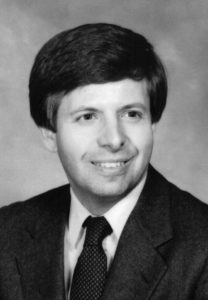
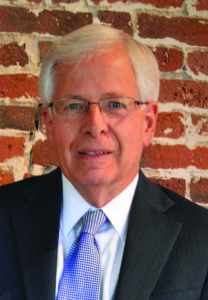 After graduating from Yale University and Boston University School of Law in 1970, Walter Mitchell began working for the Nighswander Firm, which eventually became Nighswander, Martin, and Mitchell after he became partner. In 1984, he became president of the bar.
After graduating from Yale University and Boston University School of Law in 1970, Walter Mitchell began working for the Nighswander Firm, which eventually became Nighswander, Martin, and Mitchell after he became partner. In 1984, he became president of the bar.
When asked what his most memorable experiences or achievements were as bar president, he says that “weathering the storms” of meetings with then Governor John Sununu was an achievement in and of itself.
“During my year as president, our current governor’s dad [John Sununu] was governor, and he did not seem to like lawyers,” Mitchell says with a laugh. “In the different meetings I had with him, he would express that dislike of lawyers throughout the whole meeting. I can remember sitting in the room with a lawyer named Steve Merrill – who was Attorney General and later became governor himself – and I kept looking at him like, ‘what’s going on here?’”
Mitchell says that since he was bar president, the obvious change in the NH Bar would be its size.
“There were 700 lawyers when I passed the bar and now there are over 7,000,” Mitchell says. “And that has affected relationships. Even though New Hampshire is much more civil than many other bigger states, there certainly has been a dramatic change in the interaction of lawyers, to my observation.”
Another change, Mitchell notes, is that cases don’t go to court as much as they used to.
“I don’t understand how the system can develop good trial attorneys today like it did decades ago,” Mitchell says. “When I was coming up – and I don’t hold myself out as the world’s best trial lawyer, but I’ve been in court an awful lot – the opportunity was there to be in court. Sometimes it was insurance defense work, sometimes it was collections. And it got me interacting with the judges on the bench and the other trial lawyers. Now it is much more infrequent to get into court and actually try cases. The courts load is so heavy that there is understandable pressure to solve cases before they go to trial. I’m glad I had the opportunity to get involved when I did. I’ve also been frustrated a lot recently with the electronic filing and digital court system, and yet what hasn’t changed – my impression has always been – is that we have a high-quality bench.”
After his presidential term, Mitchell continued at the firm of Nighswander, Martin, and Mitchell until 1995, when he formed Mitchell and Bates with attorney Timothy Bates. When Bates retired, the firm became Mitchell Municipal Group, where he still works today.
“In general, I always thought of it as giving back to the profession,” Mitchell says of lawyers contemplating bar governance. “And I admired a number of the people who came before me.”
